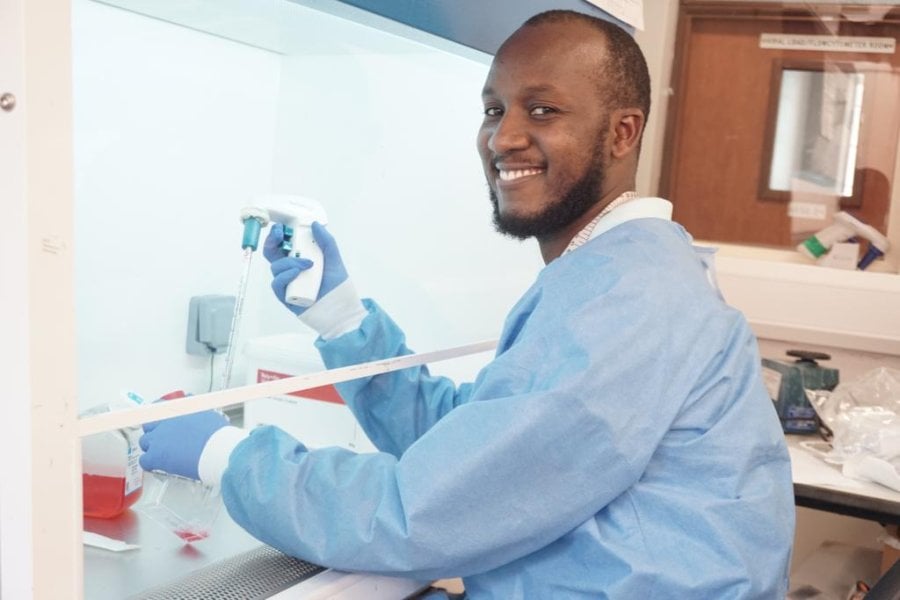
In an era marked by the relentless emergence of infectious viral diseases, the need for cutting-edge technologies to strengthen our scientific capabilities has never been more critical.
The MRC/UVRI and LSHTM Uganda Research Unit recently formed a strategic collaboration with Kings College London's Doores Laboratory to revolutionise antibody research. With funding from GIISER and the Government of Uganda, we shall be able to acquire state-of-the-art equipment, including the single-cell Cell Sorter and 10x Genomics technologies. These will enable us to address not only the ongoing battle against SARS-CoV-2, but also to prepare for future epidemic threats such as Ebola, Marburg, and Rift Valley Fever.
The new technology will help us better understand how antibodies work and how they can be used to fight diseases. It allows us to study different functions of antibodies and isolate specific ones for medical treatments. Additionally, the technology will allow us to see how infections and vaccinations affect antibody function, which is crucial for developing effective treatments and vaccines.
Advancing Antibody Evaluation
Our research focuses on studying the antibodies produced in response to the SARS-CoV-2 virus (the virus causing COVID-19). We're using cutting-edge technologies to look closely at these antibodies and learn more about how they work. We want to understand the various roles antibodies play beyond just neutralising the virus. By doing so, we can gain valuable knowledge about how the disease progresses, how our immunity develops, and find potential targets for new treatments. By combining advanced tools and methods, we can thoroughly examine the different aspects of the immune response to SARS-CoV-2, leading to exciting new discoveries in the field.
Discovering Monoclonal Antibodies
Isolating and understanding monoclonal antibodies is crucial in medical research today. Together, we want to create a way to find and isolate very powerful and precise monoclonal antibodies that can target the SARS-CoV-2 virus responsible for COVID-19. This method has enormous potential to create effective treatments and diagnostic tools that can greatly improve how we fight the virus. Additionally, the knowledge and expertise we gain from this work will help us in the future to discover monoclonal antibodies for other new viral infections. This will make us better prepared to deal with potential epidemics and keep people safer. It's an exciting step towards transforming how we combat these kinds of threats!
Unravelling Glycosylation's Impact:
Glycosylation is a process that changes how antibodies work and how effective they are. We believe it's essential to study how this process is influenced by SARS-CoV-2 infection and vaccination in different groups of people. Interestingly, African populations experienced milder COVID-19 symptoms compared to Europeans.
To figure out why this happened, we'll use advanced technologies to explore the intricate relationship between glycosylation and how antibodies function. We'll compare how these interactions differ between people in the UK and Uganda.
This knowledge is crucial because it will help us develop vaccines that produce strong immune responses and create therapeutic antibodies that work better. Ultimately, this research will lead to better outcomes for patients, improving how we deal with diseases like COVID-19.
Beyond SARS-CoV-2: Addressing Epidemic Threats:
We are dedicated to learning more about viruses, not just SARS-CoV-2. With the help of new equipment from GIISER and funding from the Ugandan government, we can now tackle other dangerous viruses that may emerge in our region. We're using advanced technologies like the Cell Sorter and 10x Genomics to study viruses like Ebola, Marburg, and Rift Valley Fever.
By taking this proactive approach, we can build on what we already know and be ready to respond quickly if new infections appear. Our goal is to safeguard the health of vulnerable communities and protect them from potential epidemic threats.
The exciting partnership between MRC/UVRI & LSHTM Uganda Research Unit and Kings College London's Doores Laboratory shows how working together, being innovative, and staying dedicated to global health can make a big difference. We are shaping a safer and healthier world for everyone by joining forces!
ABOUT THE VIRAL PATHOGENS THEME
Virology research at the Unit seeks to understand the epidemiology of HIV, oncogenic and emerging/re-emerging infections and associated co-infections, to contribute to the interventions, discovery of viruses of public health importance and to understand how pathogen diversity affects epidemics and disease outcome, with the aim of facilitating the development of effective preventive and treatment therapies.
LSHTM's short courses provide opportunities to study specialised topics across a broad range of public and global health fields. From AMR to vaccines, travel medicine to clinical trials, and modelling to malaria, refresh your skills and join one of our short courses today.
